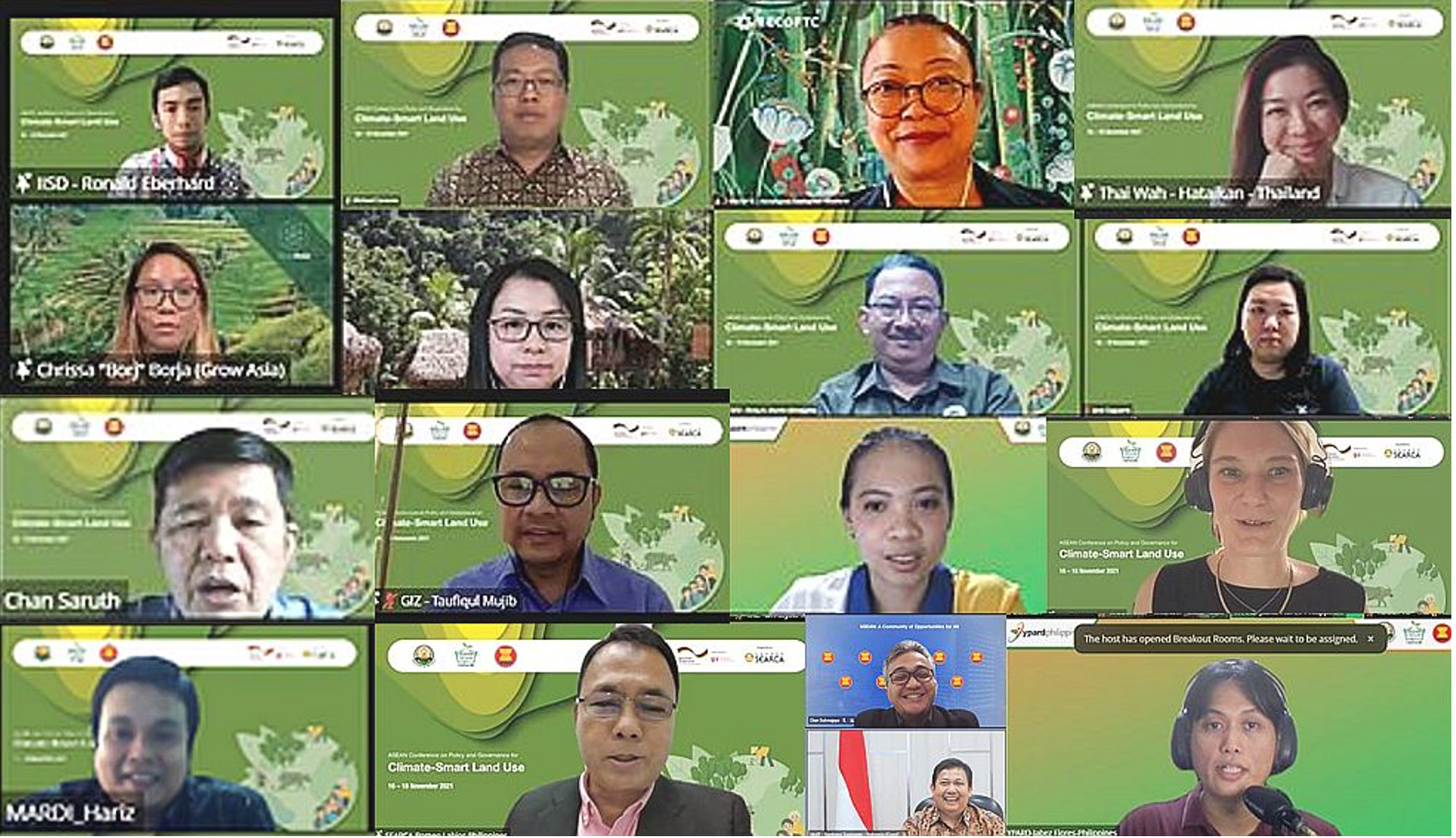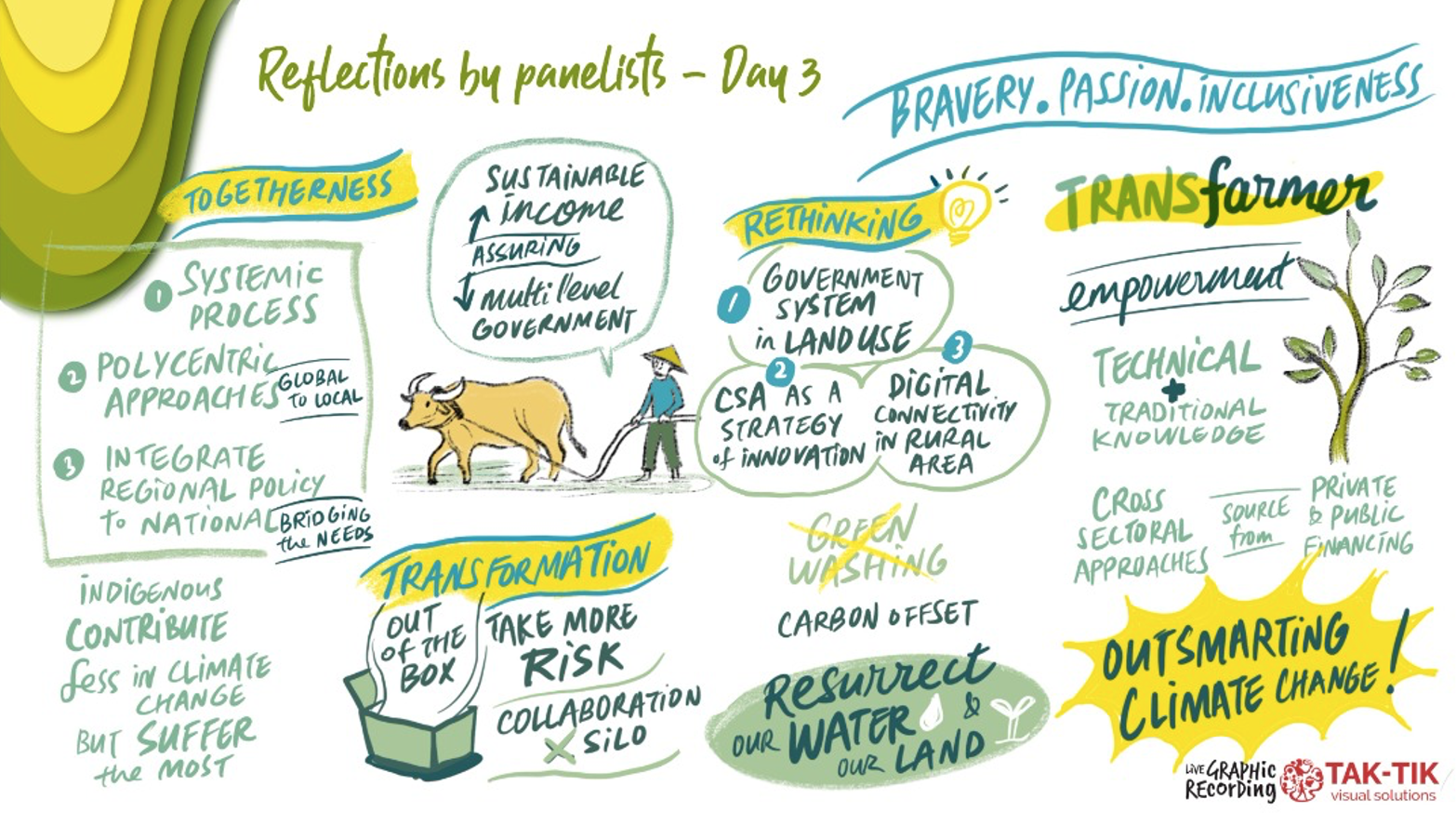Promoting a systemic approach for better climate-smart land use practices in ASEAN

‘We need to outsmart climate change.’ This important message was highlighted during the virtual ASEAN Conference on Policy and Governance for Climate-Smart Land Use between 16-18 November 2021. The event promoted a systemic view to the interlinkages between policy, governance, climate change and land use in food, agriculture and forestry.
The conference aimed to increase knowledge about strategies, policies and governance frameworks for promoting the development, adoption and upscaling of climate-smart land use practices at local, national and regional level in the ASEAN region. It was hosted by The Department of Agriculture Thailand in behalf of the ASEAN-Climate Resilience Network (ASEAN-CRN). Policymakers and experts, including those from the private sector, young people, Indigenous Peoples and women’s organisations working on food agriculture and forestry, rural development and on environmental issues, shared successful approaches and lessons learned in the Southeast Asia region. Some 192 participants attended the three-day virtual conference.
Addressing gap in national and international policy
On the first day, policymakers and experts discussed about challenges posed by climate change and, more recently, the COVID-19 pandemic and their implications for the food system in Southeast Asia. Against this background, the importance of climate-smart land use in ASEAN and the role of governance in this regard was highlighted. Recalling on the recent climate change negotiations in Glasgow, a new mission orientation to innovation, research and cooperation was called for to unlock the agriculture’s potential to solve the climate crisis.
ASEAN has a role to play in bridging the gap between international and national policies but noted the need for ownership and participation by national governments as the key drivers for regional change. During the sessions participants learned about different examples how to promote climate-smart practices in agriculture and forestry from regional to local level. One such example from Indonesia showcase the promotion social forestry through agroforestry. Reflecting on the sample of national implementation, it is important for government gives trust and secure land use rights to communities, it also motivates local stakeholders to protect their natural resources.
The roles of women, young people, local communities, and Indigenous Peoples as agents of change were highlighted during day 2 of the conference. Exploring the topic from the perspective of selected stakeholder groups, speakers highlighted that women and Indigenous Peoples are very vulnerable to the effects of climate change but also have knowledge relevant to addressing it. They described ways of empowering these groups, for example through targeted capacity building, ensuring their representation on decision-making processes and creating safe spaces for engagement. Further, the participants learned about experience from different countries such as Malaysia or the Philippines for engaging marginalised groups, local communities our youth representatives in policy development and implementation. Also representatives from the ASEAN Senior Officials Meeting on Rural Development and Poverty Eradication (SOMRDPE) shared about the existing ASEAN policy framework in relation to the needs and capacities of local communities and marginalised stakeholders.
During the plenary session on engaging marginalised groups in policy development and implementation, the perspectives of government representative and civil society were presented.
Participants received an update of development process on volume 3 of the ASEAN Regional Guidelines for Promoting Climate-Smart Agriculture (CSA) Practices. These ASEAN Guidelines have been a critical policy in bringing forward the agriculture, forestry and food security agenda in the ASEAN Member States. For more information, please visit this link.
The final day of the conference was dedicated to the question how governments can create an enabling an environment for private investments in climate-smart land use. Speakers from the academe, the private sector and the government shared their views and experience in this regard and emphasised different approaches such as clarifying land tenure, aligning subsidies with sustainable development objectives, promoting green financial instruments and creating platforms for fostering cooperation. These reflection were complemented by an input on the ASEAN Guidelines on Promoting Responsible Investment in Food, Agriculture and Forestry and how their application is being promoted across ASEAN Member States.

To round off and bring together the reflections from the entire conference, on day 3 a panel of experts provided their personal reflections. Some of their key takeaways were that farmers should be at the centre of CSA practices and should be supported by financial access and digital connectivity. Different concepts are used within the land use sector, including CSA, nature-based solutions and integrated water resources management, among many others, which will need synthesis or ‘connecting the dots’ for better climate-smart land use practices. This also requires an appropriate combination of socially acceptable technical and traditional methods. There is a need for a more systemic approach to climate challenges and to ensure that ‘solidarity’ and ownership is translated into polycentric approaches at ASEAN level, as showcased by the experiences of ASEAN-CRN and the ASEAN Negotiating Group on Agriculture.
The conference was supported by the Climate-Smart Land Use in ASEAN (CSLU) project with funding from the German Federal Ministry for Economic Cooperation and Development (BMZ) and implemented by GIZ. SEARCA and several other partner organisations contributed to the event by providing organisational support and expertise.
Contact person
Ms Hanna Reuter, Principal Advisor Climate Smart Land Use (CSLU) in ASEAN
Email: hanna.reuter@giz.de
Key buzzwords
ClimateSmartASEAN, climate change, land use, conference

